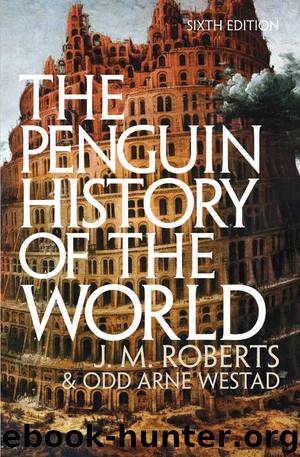The Penguin History of the World (6th Edition) by J M Roberts & Odd Arne Westad

Author:J M Roberts & Odd Arne Westad [Roberts, J M & Westad, Odd Arne]
Language: eng
Format: epub
ISBN: 9780141968728
Publisher: Penguin Books Ltd
Published: 2013-03-27T18:30:00+00:00
4
The New World of Great Powers
Among the institutions which took their basic shape in the fifteenth and sixteenth centuries, and are still with us today, are those of resident diplomacy. Rulers all over the world had sent long messages to one another and negotiated, but there were always many ways of doing this and of understanding what was going on. Some countries based their diplomacy on religion, others on (mostly imagined) ethnic ties or family ties among royals. In Qing China the fiction of the emperor as ruler of the world was maintained, and all contact with others was therefore ideally to be subsumed into concepts of petitions or tributes. Medieval kings in Europe had sent one another heralds, about whom a special ceremonial had grown up and whom special rules protected, or occasional missions of ambassadors. After 1500, among Europeans, it slowly became a practice to use in peacetime the standard device we still employ, of a permanently resident ambassador through whom all ordinary business is at least initially transacted and who has the task of keeping his own rulers informed about the country to which he is accredited.
The Venetian ambassadors were the first notable examples. It is not surprising that a republic so dependent on trade and the maintenance of regular relationships should have provided the first examples of the professional diplomat. More changes followed. Gradually, the hazards of the life of earlier emissaries were forgotten as diplomats were given a special status protected by privileges and immunities. The nature of treaties and other diplomatic forms also became more precise and regularized. Procedure became more standardized. All these changes came about slowly, when they were believed to be useful. For the most part, it is true, the professional diplomat in the modern sense had not yet appeared by 1800; ambassadors were then still usually noblemen who could afford to sustain a representative role, not paid civil servants. None the less, the professionalization of diplomacy was beginning. It is another sign that after 1500 a new world of relationships between sovereign powers was replacing that of feudal ties between persons and the vague supremacies of pope and emperor.
The most striking characteristic of this new system is the expression it gave to the assumption that the world is divided into sovereign states. This idea took time to emerge; sixteenth-century Europe was certainly not seen by contemporaries as a set of independent areas, each governed by a ruler of its own, belonging to it alone. Still less were its components thought to have in any but a few cases any sort of unity which might be called ‘national’. That this was so was not only because of the survival of such museums of past practice as the Holy Roman Empire. It was also because the dominating principle of early modern Europe’s diplomacy was dynasticism.
In the sixteenth and seventeenth centuries, the political units of Europe were less states than landed estates. They were accumulations of property put together over long or short
Download
This site does not store any files on its server. We only index and link to content provided by other sites. Please contact the content providers to delete copyright contents if any and email us, we'll remove relevant links or contents immediately.
| Africa | Americas |
| Arctic & Antarctica | Asia |
| Australia & Oceania | Europe |
| Middle East | Russia |
| United States | World |
| Ancient Civilizations | Military |
| Historical Study & Educational Resources |
Cecilia; Or, Memoirs of an Heiress — Volume 1 by Fanny Burney(32509)
Cecilia; Or, Memoirs of an Heiress — Volume 2 by Fanny Burney(31920)
Cecilia; Or, Memoirs of an Heiress — Volume 3 by Fanny Burney(31904)
The Secret History by Donna Tartt(18968)
Sapiens: A Brief History of Humankind by Yuval Noah Harari(14332)
Leonardo da Vinci by Walter Isaacson(13249)
The Radium Girls by Kate Moore(11986)
Sapiens by Yuval Noah Harari(5334)
How Democracies Die by Steven Levitsky & Daniel Ziblatt(5182)
The Wind in My Hair by Masih Alinejad(5062)
Homo Deus: A Brief History of Tomorrow by Yuval Noah Harari(4879)
Endurance: Shackleton's Incredible Voyage by Alfred Lansing(4727)
Man's Search for Meaning by Viktor Frankl(4517)
The Silk Roads by Peter Frankopan(4495)
Millionaire: The Philanderer, Gambler, and Duelist Who Invented Modern Finance by Janet Gleeson(4431)
The Rape of Nanking by Iris Chang(4183)
Joan of Arc by Mary Gordon(4066)
The Motorcycle Diaries by Ernesto Che Guevara(4057)
Hitler in Los Angeles by Steven J. Ross(3927)
